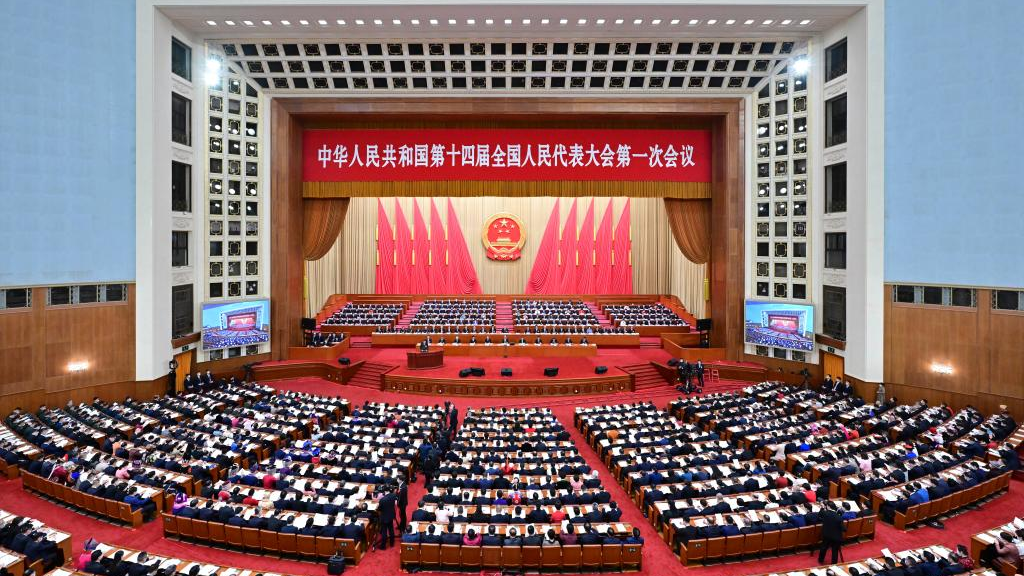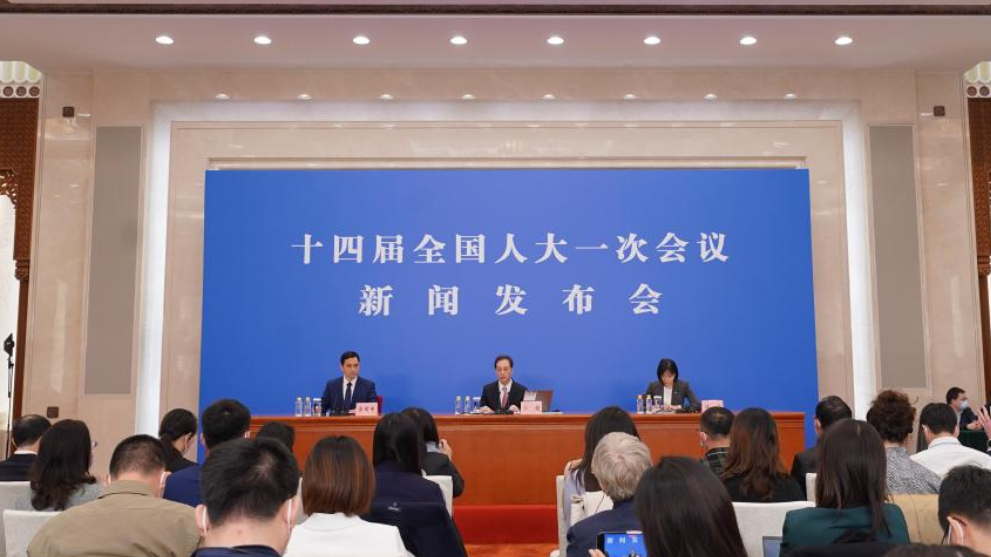
The opening meeting of the first session of the 14th National People's Congress (NPC) is held at the Great Hall of the People in Beijing, China, March 5, 2023. /Xinhua
The opening meeting of the first session of the 14th National People's Congress (NPC) is held at the Great Hall of the People in Beijing, China, March 5, 2023. /Xinhua
Editor's note: Kong Qingjiang is the dean of the School of International Law at the China University of Political Science and Law. The article reflects the author's opinions, and not necessarily the views of CGTN.
It is often said the law itself is the foundation of the rule of law and that lawmaking in the form of legislation is the premise for practicing the rule of law in a country. Since more and more lawmaking was expected in the course of reform and opening-up, China enacted the Legislation Law in 2000. The Legislation Law, which is the basic law that regulates the national legislative system and legislative activities and maintains the unity of socialist rule of law, is dubbed as the "law on lawmaking." Indeed, since the promulgation of the Legislation Law, a sophisticated system of laws have come into existence in China which generally helps promote its economic and social development. Then the question arises: Why is the Legislation Law to be amended again during the ongoing session of the 14th National People's Congress (NPC)?
There are at least two reasons: First, the Legislative Law was made to standardize the process of lawmaking and pave way for furthering reform and development, among other things. However, as the country engaged in deepening reform and high-level opening-up, the Legislative Law gradually exhibited its constraints. For example, as often noticed, there exists inconsistency between legal provisions in various pieces of laws, which gives rise to difficulty in uniform application of laws and uncertainty in legal consequences. Lawmaking shall thus focus on improving the legislative quality and more emphasis shall be put on the systematization, integrity, synergy of the legislation. Also, it is found the legal provisions lag behind the economic and social development. Lawmaking shall be timely, for legislation must be responsive to the economic and social development to keep it relevant.
This calls for scientific, democratic, systematic and timely lawmaking. The national legislature, i.e., the NPC and its Standing Committee, shall adhere to scientific, democratic and law-based legislation, and enhance the systematism in the process of formulating, amending, repealing, interpreting and codifying laws.
Moreover, to adapt to the new situation, it is necessary to correctly handle the relationship between reform and the rule of law in the new era, and to better heed to the practical need of promoting reform under the rule of law and improving the rule of law in the process of deepening reform.
Since the 18th CPC National Congress, the National People's Congress and its Standing Committee have actively adapted to the needs of reform and opening-up and economic and social development, adhered to the unity of promoting reform under the rule of law and improving the rule of law in the process of reform. The national legislative strengthened the enactment, amendment and repeal of laws in light of the needs for reform, so as to provide legal basis for promoting relevant reform in a timely manner.

Wang Chao (C, rear), spokesperson for the first session of the 14th National People's Congress (NPC), attends a press conference at the Great Hall of the People in Beijing, China, March 4, 2023. /Xinhua
Wang Chao (C, rear), spokesperson for the first session of the 14th National People's Congress (NPC), attends a press conference at the Great Hall of the People in Beijing, China, March 4, 2023. /Xinhua
It is thus advised to carefully summarize the practical experience of the legislative work in the new era and improve the legislative system. For example, it is proposed that the Standing Committee of the NPC strengthen the overall arrangement of legislative work through legislative planning, annual legislative plans, special legislative plans and other forms. It is also proposed that the law draftsmen shall carefully study the delegates' proposals and suggestions, extensively solicit opinions from experts and the public, and engage in scientific evaluation of the proposals, suggestions and comments.
Secondly, the comprehensive rule of law is a profound revolution in national governance. Comprehensive rule of law highlights the important role of the Constitution in the governance of the country, which means adhering to the rule of the Constitution, strengthening the implementation and supervision of the Constitution, improving the institutional system to ensure the full implementation of the Constitution, and safeguarding the authority of the Constitution. Since the country embraced the comprehensive rule of law, the issue of unconstitutionality of certain laws and regulations came to the surface from time to time. Certain local regulations and rules are found to be contradicting.
It is therefore advised to clarify the requirements for constitutional review to strengthen the implementation and supervision of constitutional laws and other laws. It is further proposed from the perspective of system design, to specify the constitutional review requirements in the filing and review work, and improve the filing and review system.
Throughout the recent years, the NPC and its Standing Committee have strengthened the constitutional review of the regulations and rules. It is necessary to summarize the practical experience of the implementation and supervision of the Constitution with a view to ensuring the implementation of the Constitution. After all, a scientific, effective, systematic and complete filing and review system is conducive to safeguarding the authority of the Constitution.
In conclusion, the above two factors have already underscored why the amendment of the Legislation Law was high on the agenda of the 14th NPC when the country is striving for a comprehensive rule of law and pursuing deepening reform and high-quality development. It is expected that with the new amendment, the legislative work in the new era will be more responsive to the reform and development, and the governance with Chinese characteristics will be given a thrust in its way towards the comprehensive rule of law.
(If you want to contribute and have specific expertise, please contact us at opinions@cgtn.com. Follow @thouse_opinions on Twitter to discover the latest commentaries in the CGTN Opinion Section.)